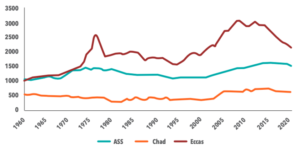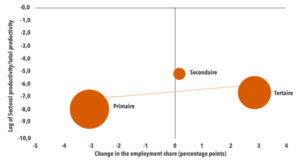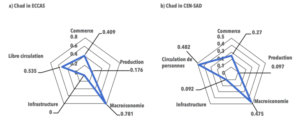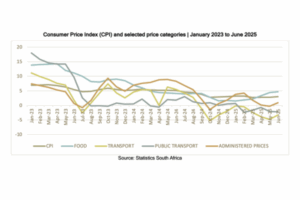The African Continental Free Trade Area (AfCFTA) is unlikely to boost intra-trade in Chad, according to our study, which recommends several measures to promote development, growth and poverty reduction in the north-central African country.
Introduction
The debate on the impact of free trade on economic and social performance is as old as that on the determinants of wealth creation.
The African Continental Free Trade (AfCFTA) agreement has brought this debate back to the forefront.
Free trade presents two likely contradictory effects on economic and social performance:
- A positive causal effect by considering trade as a factor of wealth creation, and
- A negative causal effect through the creation of “pressing shops” and the “race to the bottom” in wages, environmental and labour standards.
An alternative view admits a conditional effect of free trade, African countries have experimented with import substitution policies. The positive link is in economic diversification and the creation of value chains.
The debate on the link between free trade and workers and trade unions comprises;
- Collective bargaining power and social protection of workers in a context of trade liberalisation
- Free trade and the convergence of labour standards
- Economic migration in relation to the free movement of people
- Sectoral distributional effects of free trade on worker welfare
Statement of the research question
The Analysis of the effects of the free trade area of the African continent (AfCFTA) on living and working conditions in Chad study mainly analyses the sectors of the economy that could expand as a result of the implementation of the AfCFTA agreement. The study also examines working conditions and trade union rights issues in these sectors to identify potential risks.
Study methodology
The study methodology is based on literature reviews, stakeholder engagements and a field survey.
The main results of the study
- AfCFTA’s implementation is unlikely to boost Chad’s trade with the State Parties because of the shortcomings noted in terms of productive complementarity and infrastructure deficit.
- Non-tariff barriers (insecurity and corruption) are likely to limit the impact of the AfCFTA on intra-regional trade.
- The sectors that will likely expand are cotton, crude petroleum oil or bituminous minerals, cattle, raw materials of vegetable origin, gold, leather, gum arabic, sesame, onion, garlic, wheat, sugar cane, rice, spirulina, textiles, natron, dates, groundnuts and shea.
- The sectors that will likely decline are sugar, cement and flour.
Comparative change in GDP per capita (in constant 2015 dollars)

Source: Author based on WDI (World Bank) data
Share of employment by sector of activity over the period 1991-2019

Source: Evaluation report on the implementation of the NDP 2017-2021
ARII of Chad in ECCAS and CEN-SAD

Source: Africa Regional Integration Index Report (2019)
Revelations from the survey on working conditions
Low worker unionisation
The low unionisation of workers in the three observation provinces (N’Djamena, Ouaddaï and Logone Oriental) is mainly due to challenges in communication by trade unions and a lack of interest by workers.
Weak social protection for workers
There is low protection for workers (salary level, work contract, working hours, health insurance and holidays). Self-employed workers and workers in tertiary and primary sectors deserve special attention concerning social protection. This does not differ significantly across Chad’s provinces.
Conditions and quality of work
Workers are exposed to several risks, mainly dust, noise, extreme temperature and smoke. The workers have a fair degree of protection against these risks.
Conflict management at work
The sources of conflict at work are as numerous as the ways of managing them. Six months before the survey, 33 workers said they had experienced a work-related conflict. The conflicts were mainly related to the interpretation of the contract and accidents at work. Conflicts at work are resolved through amicable settlements, with a weak role for the labour inspectorate due to limited human and material resources.
Study recommendations
- To make AfCFTA an instrument for promoting development and accelerating growth and poverty reduction, countries should bridge the infrastructure and production gaps through the export of labour-intensive products, such as agricultural products and essential manufactured goods, and creating a regional value chain
- Emphasise social protections for workers in the sectors most likely to expand under the AfCFTA
- Have an effective online monitoring mechanism for non-tariff barriers. Non-tariff barriers form a major component of the cost of trade.
- Strengthen communication on the AfCFTA to all stakeholders
RELATED RESOURCE: A Guide to the African Continental Free Trade Agreement







